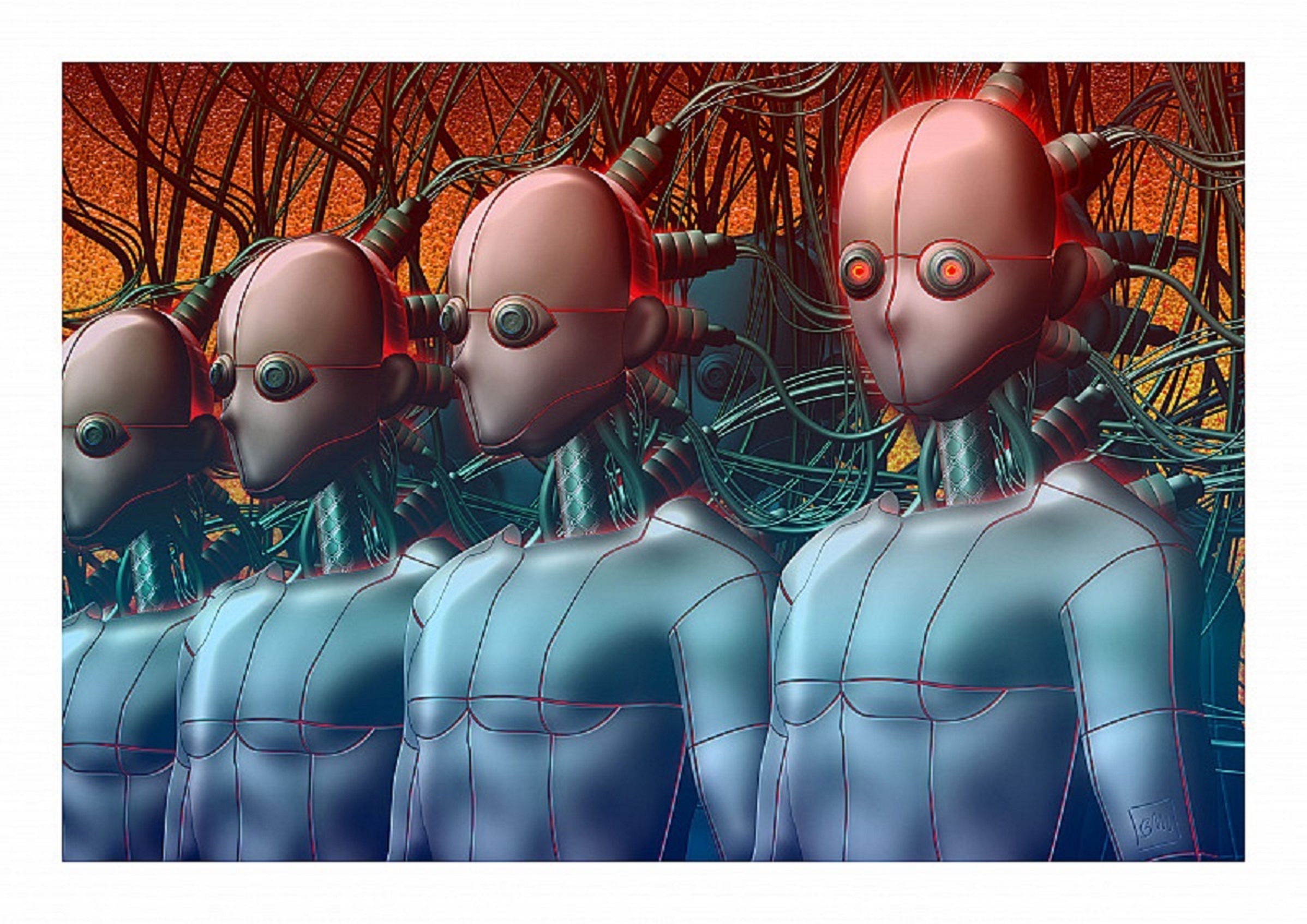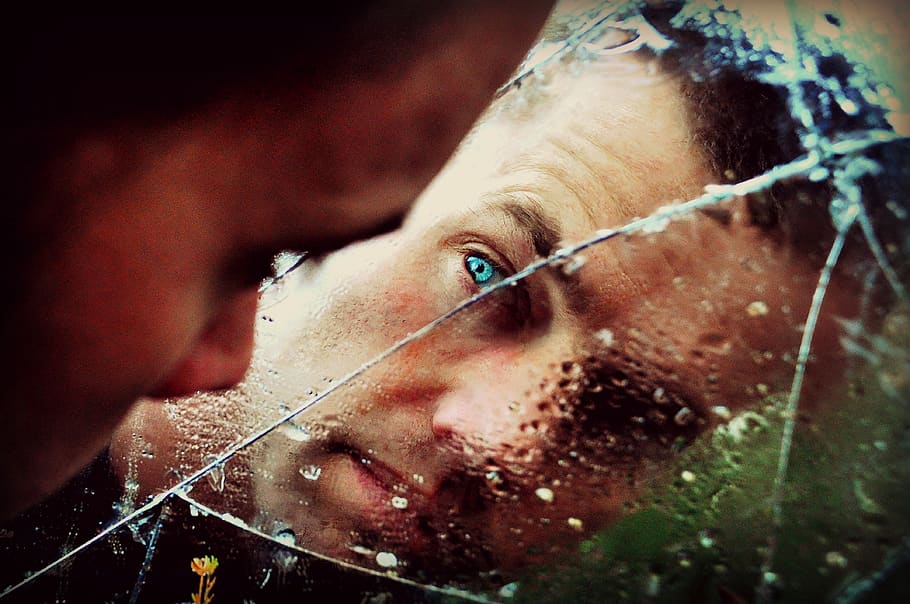‘Stickiness’ comes about because of the way in which we hold on in an absolutely unquestioning way to a basis which is utterly and completely nonsensical. We are absolutely unwilling to question this basis – we are fundamentally unwilling to questioning this basis. Questioning the basis isn’t and never will be up for negotiation and this ‘infinite unwillingness’ of ours to actually look at what we’re doing has its consequences. We may not have to question what we’re doing therefore, but we do have to live with these consequences!
The consequences that we’re alluding to here are that we are going to be positively disposed towards anything that supports this unexamined position of ours, and negatively disposed to whatever doesn’t support it. Moreover, it is also going to be the case that this affinity or repulsion is going to be involuntary on our part – we will have no control over it at all, and we will also have no insight into the real reason why it comes about. And not only will we not have any understanding into where this compulsive attraction or aversion comes from or what it is really about, we will mistakenly imagine that the feeling of affinity or repulsion is a manifestation of our true selves, and that it has a straightforward, honest basis. We will in other words find ourselves in a position where we have to make out to ourselves that our ‘positive or negative automatic judgement’ (whatever it may happen to be) is perfectly justified, that it has a very sound basis in reality…
This unconscious or unacknowledged commitment to something that just isn’t true lies at the root of all the absurdities that we observe in human behaviour. We can look at this in one of two ways – we can either say that this situation will result in us doing all sorts of ridiculous things (and having at the same time to staunchly stand by what we are doing as not being ridiculous), or we can say that it will result in us being hoodwinked the whole time in all sorts of absurd and preposterous ways (all sorts of absurd and preposterous ways that can’t allow ourselves to see as being such). So on the one hand we’re endlessly susceptible to fooling ourselves or we’re equally endlessly susceptible to being fooled by others. Either way, this clearly isn’t going to work out well for us! Being dishonest with ourselves in the way that we are talking about means therefore that we’re wide open to being taken for a ride – we’ve got ‘mark’ written all over us. We’re anybody’s – the fact that we’re committed to not seeing the truth (without being able to see that we committed in this way) makes us infinitely susceptible to being fooled by every trickster, every con artist, every charlatan who comes along.
The question is – therefore – what exactly are we fooling ourselves about? What is the thing that we’re being dishonest with ourselves over? The first answer – which we have already given – is that we are hanging on with great determination to a basis that is completely nonsensical. If we could allow ourselves to see this basis for what it is then we would no longer be driven to approve of stuff that agrees with it, or disapprove of stuff that disagrees with it. We would no longer be ‘sticky’ – we would no longer be ruled by our attachments. Being sticky means – needless to say – that all sorts of rubbish adheres to us. It sticks to us and blocks out anything that isn’t rubbish. It forms a barrier (like a cocoon) between us and reality – we’re sealed off from reality in a cocoon that is made up of meaningless nonsense! Because our basis is nonsensical, anything that agrees with it is also nonsensical. Anything that disagrees with our basis is also nonsensical. It’s completely and utterly nonsensical either way!
Being ‘sticky’ means that all we ever know (or care about) is nonsense that we can’t see as such. It also means that we can never know about reality, which is not nonsense. The only way we could ever see reality would be if we were prepared to see the truth about our basis, if we were prepared to own up to the sheer ridiculous nonsensicality of it and this – as we have been saying – is the Big Taboo. We’d never do this – seeing the absurdity of our basis (the basis that we use for understanding life) has become something quite literally unthinkable. Seeing this about ourselves is rather like seeing that a belief that has given our life meaning and direction for as long as we can remember is actually a pile of crap. Naturally enough, this isn’t something that we are going to be particularly keen to do! Seeing that our cherished belief – which we have spent so much time and energy promoting and defending – is a crappy deception that we have perpetrated upon ourselves (because we weren’t big enough or brave enough to see the truth) is the bitterest of pills to swallow….
Seeing the quintessential phoniness and worthlessness of our basis is like this, but it goes even deeper. It hurts more. This isn’t just a belief system we’re talking about here – it’s the basis for all our beliefs. It’s the basis for any possible belief, any possible idea or concept about reality that we might have. It is our most fundamental orientation – it’s our ‘most taken for granted thing’. We don’t take anything more for granted than this – it’s so taken for granted that it perfectly invisible. We never look at it; we never need to look at it. Why would we need to look at it when we feel that we know it so well? This ‘thing’ that we’re talking about is the self. We all think that we know who we are – we’re all so very sure that we know who we are that we never feel the need to re-examine it. We never examine it in the first place! All of our energy, all of our enthusiasm for life gets diverted into acting on the basis of this assumed identity, securing advantageous outcomes (or avoiding unfavourable ones) on the basis of this assumed identity, building up security systems for the sake of this assumed identity, and so on. The energy and ingenuity we put into it is never-ending! Unless we happen to be philosophically inclined – and almost nobody is, given the profoundly non-philosophical nature of our culture – we aren’t ever going to sincerely examine the question of who we are. Right up to the point at which we die we aren’t going to do this…
It’s not that discovering that I am not this identity that I took myself to be is necessarily so very hard; the uncovering of the truth in this regard is not distressing or painful or disturbing in itself. What causes the problem is our investment in that self; what causes the problem is the way that we have put all our eggs in the one basket, when that basket isn’t even real in the first place! Or to approach this from a slightly different angle, our unwillingness to seeing the truth comes about because of the way in which we have been so very consistently saying to ourselves that this arbitrary viewpoint is not arbitrary at all. We’re resistant to seeing the essential arbitrariness of our way of looking at things; we’re resistant to seeing that our basis is ‘empty’. This is a very odd kind of a thing however – to discover the essentially arbitrary nature of our viewpoint is to discover a tremendous freedom, whilst not discovering this arbitrariness is to allow ourselves no freedom. We have zero freedom and at the same time we are rendered incapable of seeing that we have zero freedom. This being the case – as it is – the question arises as to why we chose imprisonment over freedom?
We have already answered this question in one way by saying that what imprisons us is the investment that we have made in not seeing the truth of what is going on. Once we believe that our viewpoint, our way of understanding ourselves and the world, is the only way then naturally we start investing in it. We believe ourselves to be standing on solid ground so we proceed to build upon it. We create a super-structure, which we keep on adding to and adding to, hoping this way to one day reach heaven itself (much in the fashion of the builders of the Tower of Babel as related in the Old Testament). What we’re building only makes sense if our basis isn’t arbitrary of course and so we really can’t afford to see that this isn’t the case. We become therefore extremely averse to discovering that our basis is not as rock-solid as we had assumed it to be, and extremely enamoured of anything that supports us in believing that it is, and it is this attraction / aversion that we have been referring to as ‘stickiness’.
Strictly speaking (in line with what we have already said) it is not our arbitrary viewpoint that is completely and utterly nonsensical – it is the investment on the basis that our viewpoint is not arbitrary that is nonsensical. Anything we do on the basis that what is not true actually is true is nonsensical / ridiculous. It wouldn’t of course be ridiculous if what we were claiming to be true actually was true – in this case we would be perfectly justified in what we are doing. News that lets us know that what we say is true actually is true causes us to feel marvellously validated and vindicated therefore. We would feel validated and vindicated to the hilt – we would feel right and everyone likes to feel right. But if on the other hand we hear news that lets us know that what we are clinging to so desperately, promoting so humourlessly, investing in so heavily, isn’t true then this turns everything around completely. Instead of feeling validated and vindicated, justified and affirmed, etc, we get the complete reverse of this. It’s the other way around – we get the other end of the stick (the rough end) coming back at us and catching us a good solid crack across the side of the head and this doesn’t feel good at all…
We can look at this in terms of ‘insult’ versus ‘flattery’ and say that our capacity to feel insulted is the very same thing as the capacity to respond favourably to flattery. This capacity is what we have been calling stickiness – stickiness means that both insults and flattery stick to us rather than passing harmlessly by. Stickiness, as we have said, comes about because of the way in which we are clinging tenaciously to a position as if it were tenable when it isn’t. This puts us in a very awkward spot – it banjaxes us very thoroughly. It’s not that I am lying but know that I am, but rather that I am lying but can’t afford to let myself know that I am. I’m lying to myself about my position being tenable when it isn’t but I’m not owning up to the fact that I’m deceiving myself in this way. I’m in denial of what I actually know only too well and this is what makes me sticky. This is the root of my infernal pestilential stickiness…
Anything that comes along and lends credence to the phoney story that I am telling myself is sweeter than the sweetest honey to me. It is music to my ears – it’s what I want to hear. It’s what I so desperately need to hear. It’s flattery. Anything on the other hand that comes along to threaten the integrity of the lie that I am telling myself is the exact opposite of flattery – it’s a deadly insult. It stings like nothing else. It cuts me to the quick. It outrages me to the very core. I am stung so very badly because I know what I am hearing to be true, whilst at the same time being totally committed to believing in the lie not being a lie. Life thus becomes nothing more than the constant struggle to avoid insults and obtain flattery, to avoid blame and attain praise, to avoid approval and avoid disapproval, and whist we are engaged in this struggle we cannot allow ourselves to see what we’re doing, and why we’re doing it. Instead, we have to validate what we’re doing; we have the see the insults and flattery as being objectively true values in themselves. We can’t allow ourselves to see that it’s all a trick that we’re playing on ourselves; we can’t allow ourselves to see that it’s all on a dishonest basis. We can’t in other words allow ourselves to see that we’re ‘slaves to the game’…
The ‘unacknowledged need to lie to ourselves’ – which comes about as a result of fear – puts paid to any possible chance of freedom. It eradicates all freedom from the picture. Once we’re caught up in this business – as we always do get caught up – any trace of freedom goes out of the window. We’re not allowed any freedom and that’s all there is to it. That’s the end of it – we just have to get on with it, we just have to knuckle down and get our noses to the grindstone. We are now slaves to chasing praise and avoiding blame, courting approval and running away from disapproval, without ever seeing what it’s all really about. We’re very effectively trapped at this stage – looking for merits isn’t going to benefit us any more than avoiding demerits will. ‘Gaining the advantage in the game’ doesn’t benefit us because the game is actually denying us. Incurring the disadvantage doesn’t benefit us either because this is still corroborating the reality of the game. If I get a merit, a commendation, a pat on the back, then it’s not who I really am that gets it but the false idea of myself, and if I get a demerit, a black mark against my name, then similarly it’s not who I really am that is incurring it but the game’s illusory version of who I am. Who I truly am gets just as effectively buried either way…
Being sticky means that I am going get buried; it means that I am inevitably going to get buried. I get buried in neurotic suffering. Being sticky means that I am going to get bogged down in a never-ending series of false issues and distracting preoccupations. Everything that ever happened to me ‘sticks’ fast to me – I hang on to the ‘bad’ things that have happened just the same as I hang on to the ‘good’ things. Being sticky means that I accumulate history – I accumulate history because I can’t ever let go of anything! I am weighed down with my own history and as I move through life I can’t help getting heavier and heavier with it. “The past gradually grows around one, like a placenta for dying” says John Berger.
Ultimately, what sticks to us when we’re sticky is ‘a false idea of ourselves’ – that’s what we end up stuck to. Oddly, we tend to see having a solid history, a solid account of who we are and what we have done as being a positive thing, something everyone needs to have if they are to feel as if they have a place in the world. We wouldn’t want to lose our personal history. We wouldn’t want to be divested of all the stuff that’s stuck to us. And yet as we have just said the thing about this ‘account of who we are’, the thing about this ‘personal history’, is that it all belongs to someone who isn’t us. It all belongs to the false idea that we have about ourselves and so just so long as our so-called ‘history’ is there, who we actually are can’t be…






